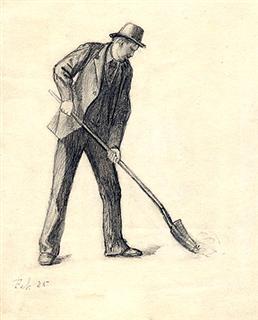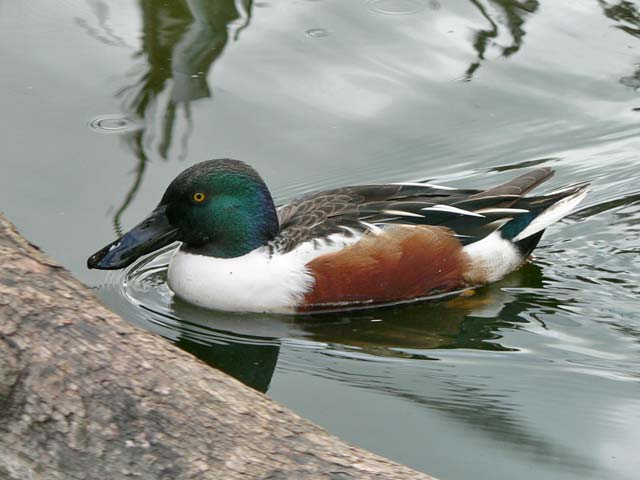Let us imagine you are sitting at home, in an armchair, with your feet up, listening to Scriabin on the radio perhaps, or reading Martin Amis’s very sensible new novel Lionel Asbo : State Of England, or simply gazing vacantly into space, like a dimwit or a simpleton, though you need not actually be a dimwit or a simpleton, merely dozing, half-asleep, at the border of the Land of Nod. Then imagine that your poppet rushes into the room, from the front garden, crying “Dennis! Dennis! Come and see!”
Whatever you have been doing, or not doing, you sit bolt upright and ask “What is it?”
“Come and see the shoveller!” cries your poppet.
It is important to note, and indeed it is the very crux of my argument, that, while still sat in your armchair, before following your poppet out to the front garden, you do not know what she is talking about. Note, too, that I did not write, you have no idea what she is talking about. There is a difference, and a critical one. It is not the case that, at this stage, you have no idea. On the contrary, you have a very good idea. You know that, once you are in the front garden, in response to your poppet’s urgent beckoning, you will see one of two things. But because you do not know which, it is fair to say that you do not know what she is talking about. Thus may we calibrate the efficacy of human communication through words.
Let us leave you in your armchair for a moment, and examine what you know. You know that, from the vantage point of your front garden, a shoveller can be seen. But what kind of shoveller? There are, as I have indicated, two types. The shoveller may be a person with a shovel, or it may be a duck. Before hoisting yourself out of the armchair and making your slow, creaking, exhausted way into the front garden, you might want to ascertain the type of shoveller your poppet is eager for you to see. You can ask, “Is it a person with a shovel or a duck?” But it may be that your poppet has already rushed back out, and is out of earshot, in which case you might make an educated guess.
For example, which type of shoveller is likely to spark your poppet’s excitement, and spark it sufficiently that she wishes to share it with you? If you, or she, or both, are fanatical ornithologists, it is a near certainty that she is talking about a duck. But what if ornithology plays no important part in either of your lives? Astonishingly, such people do exist! In that case, guesswork will avail you little. Conversely, your home might be slap bang next to important roadworks on the Blister Lane Bypass, the racket of which has been causing you grief while listening to Scriabin or reading Martin Amis or dropping off to sleep. In that case, in all likelihood your poppet has seen a person with a shovel. But why would that spark her excitement, so much so that she rushes in, to tell you about it, and rushes out again, to see? Even if we grant the possibility that you, or she, or both, are fanatical civil engineers, there will be shovellers – that is, persons with shovels – aplenty to be seen for the duration of the roadworks which, being important, will be a period of weeks or even months. On balance, and irrespective of your fanaticism or lack of it in the field of civil engineering, you might decide that the duck is the more probable shoveller, based on the information thus far available. Even if neither you nor your poppet are fanatical ornithologists, she may have been struck by a sense of wonder, out of the blue, as sometimes people are, at sight of a bird. There is literature on such epiphanies.
With you still in your armchair, we have been able to weigh the likelihood of the type of shoveller your poppet wants you to see. We cannot say for certain it is a duck, but the chances are that it is. Narrowing it further, to a Red shoveller, Cape shoveller, Australasian shoveller, or Northern shoveller, will have to wait until you make it to the front garden and see for yourself, unless, impatient, your poppet rushes back in to implore you to hurry, in which case you can ask: “Of the four types of dabbling ducks with long broad spatula-shaped beaks known as shovellers, which is it?” Beware, however, that you will only get a sensible answer to this question if (a) your poppet is a fanatical ornithologist, and (b) if the shoveller she has seen is indeed a duck, and not a person with a shovel.
For let us not forget that the type of shoveller is not yet settled beyond all doubt. By deciding, on the balance of probabilities, that your poppet is talking about a duck does not mean we can airily dismiss the possibility – and it is no more than that – that she is talking about a person with a shovel. We can briefly examine the circumstances which make that actually more likely than the duck.
What if?, we ask, and it is often the prefix to a question which can yield significant if unexpected results, what if the shoveller your poppet spotted was a person with a shovel who was not engaged in important roadworks on the Blister Lane Bypass, but was a gravedigger? The sight of a person with a shovel digging a grave just outwith your front garden would be cause for surprise, and alarm, would it not? It could be considered a portent, even a supernatural vision. Key to deciding if this could be the cause of your poppet’s excited rushing in would be her tone of voice and her countenance. Innocent excitement, as occasioned by a bird epiphany, can easily be confused with fright, or terror. It may be that your poppet is on the verge of hysteria and nervous collapse, having seen a sinister figure digging a grave just outside your front garden, a grave thus intended, as in a vision, for you, or your poppet, or both. We might argue that she would have said “gravedigger”, not “shoveller”, but it is worth remembering that when on the verge of hysteria or nervous collapse language can become skewed or fractured or otherwise dislodged from the norm.
To know, beyond all doubt, what your poppet is talking about, language itself is not enough. You are going to have to hoist yourself out of your armchair and see for yourself. That is the basis of all science.
Shoveller
Shoveller


